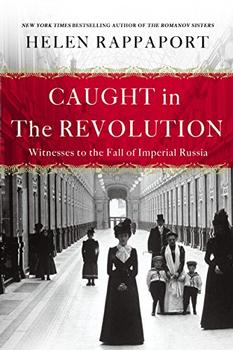Summary | Excerpt | Reviews | Beyond the Book | Readalikes | Genres & Themes | Author Bio

Petrograd, Russia, 1917 - A World on the Edge
by Helen Rappaport
Eight days after the Tsar's reception an Allied delegation of high-ranking British, French and Italian officials led by Lord Milner – an eminent member of David Lloyd George's War Cabinet – arrived in the city for a major conference aimed at consolidating continuing cooperation with Russia and keeping her in the war. Although the expatriate community looked forward to the inevitable junketing that such a visit would generate, it came at a time of serious industrial unrest. For on the very day the mission arrived in the capital, 150,000 workers went on strike and marched in commemoration of the massacre of peaceful protesters, killed that same day, twelve years previously. Bloody Sunday 1905 was an ever-present memory for the oppressed working classes of Petrograd, as tension continued to build in the city.
Tsarist officialdom, however, was preoccupied with the more immediate crisis in Petrograd's desperate accommodation shortage, which the arrival of the mission had provoked. Guests on the ground floor of the already overcrowded Hotel d'Europe had their rooms commandeered for the duration, but found there was 'nowhere to go and no rooms to be had at any price'. A last-ditch orgy of official parties beckoned over the next three weeks, prompting a brief lifting of spirits in the weary capital. 'For a short time one could almost have imagined oneself back in prewar St Petersburg,' recalled Meriel Buchanan, who made the most of the glittering social whirl
A sudden gaiety swept over the town. Court carriages with beautifully groomed horses and the crimson and gold of the Imperial liveries passed up and down the streets. An endless stream of motors stood at all hours of the day before the Hotel d'Europe, where the Missions had been lodged. Dinners and dances took place every night; the big royal box at the ballet was filled with French, English and Italian uniforms.
Nicholas II once again put on his gracious public face for a gala dinner at Tsarskoe Selo, with Sir George Buchanan sitting at his right hand. The gathered delegates joined in the charade of sharing 'meaningless remarks about the Alliance, war and victory'. Nicholas was, as always, 'vague' in conversation and, after a succession of dutiful and dull exchanges, withdrew with a smile. The reclusive Empress had, as usual, been absent. It was left to the leading ladies of the Petrograd aristocracy, in the guise of Grand Duchess Vladimir and Countess Nostitz (an American adventuress who had married into the aristocracy), to organise some of the other lavish entertainments laid on for the mission, with Nostitz claiming that she had been chosen to host the reception on 6 February at her home because 'the Empress was too ill to receive at the Palace'. It would leave an abiding impression on her:
The night of that last splendid reception is stamped forever on my memory. I have only to close my eyes to see again our rose and gilt salon with its magnificent old family portraits, its exquisite tapestries, crowded with that brilliant assembly of guests. All the Court, the cream of Petrograd society, three hundred of its greatest names, all the Diplomatic Corps and their wives, the members of the Delegation – Lord Milner, one of England's foremost Ministers, Lord Brooke, Sir Henry Wilson, Lord Clive, Lord Revelstoke, Sir George Clerk, General de Castelnau, France's hero, Sociologue, the Italian delegate, Gaston Doumergue, they were all there that night.
When the visit came to an end, few felt it had achieved anything of political significance. Robert Bruce Lockhart had been far from impressed with the 'interminable round of festivity', later observing that 'rarely in the history of great wars can so many important ministers and generals have left their respective countries on so useless an errand'. Ambassador Paléologue felt likewise: the conference had dragged on for three weeks 'to no purpose', and 'no practical result ha[d] emerged from all the diplomatic verbiage'. What point was there, he asked, in the Allies sending Russia huge consignments of materiel – 'guns, machine-guns, shells and aeroplanes' – when she had 'neither the means of getting them to the front nor the will to take advantage of them?'
Excerpted from Caught in the Revolution by Helen Rappaport. Copyright © 2017 by Helen Rappaport. Excerpted by permission of St. Martin's Press. All rights reserved. No part of this excerpt may be reproduced or reprinted without permission in writing from the publisher.




The dirtiest book of all is the expurgated book
Click Here to find out who said this, as well as discovering other famous literary quotes!
Your guide toexceptional books
BookBrowse seeks out and recommends the best in contemporary fiction and nonfiction—books that not only engage and entertain but also deepen our understanding of ourselves and the world around us.